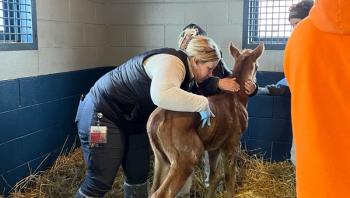
California opinion nixes declaw ban; CVMA claims victory
Sacramento, Calif. — The Department of Consumer Affairs (DCA) deemed West Hollywood's declaw ban unconstitutional.
Sacramento, Calif. — The Department of Consumer Affairs (DCA) deemed West Hollywood's declaw ban unconstitutional.
In an opinion sought by the California Veterinary Medical Association (CVMA), state legal authorities overrode the 2003 city ordinance that called the procedure a crime.
dvm Business STAT
The December report claims West Hollywood officials have no authority to supersede the California Veterinary Medicine Practice Act, which classifies cat declaws as a legitimate surgical procedure to be performed by licensed veterinarians.
It's the hammer CVMA officials have been waiting for as the association continues to fight copycat ordinances in other California municipalities, Executive Director Valerie Fenstermaker says. The state, a hotbed for animal activism, leads the nation when it comes to challenging controversial veterinary medical procures. During the 2003-2004 legislative session, California lawmakers rejected a bill to outlaw cat declaws statewide, and last year, the Senate almost considered a canine ear-cropping ban.
"When you read the opinion, it's very clear that someone has to be in charge of veterinary practice, and that should not be local ordinances," Fenstermaker says. "It would really hamper veterinary procedures if every local community could decide what could or could not be done, regardless of what the state allows."
Inside the opinion
Echoing Fenstermaker's sentiment, the Department of Consumer Affairs opinion reads: "Such local regulation of veterinary practice in different jurisdictions would ultimately create a chaotic and confusing situation where it would be difficult for licensed veterinarians to know which veterinary procedures are legal or not depending on jurisdiction."
This means, Fenstermaker adds, that the handful of veterinarians practicing in West Hollywood aren't governed by local law that makes it a misdemeanor crime to perform "an onychectomy or flexor tendonectomy procedure by any means on any animal" within city limits. That's until West Hollywood officials decide the challenge the Department of Consumer Affairs ruling.
According to state law, the California Attorney General's office recognizes the department's opinion until it is challenged, thereby forcing the officials to determine the validity of the position. At presstime, West Hollywood did not have formal plans to address the state, but after requesting a copy of the opinion from DVM Newsmagazine, the mayor's Chief of Staff Hernan Molina admits officials were waiting for the decision.
"We'll definitely jump on that," he says.
Bottom line
In a Jan. 7 letter to practitioners, CVMA President Jon Klingborg, DVM, states, "The CVMA has notified the West Hollywood City Council of this important decision and will continue to inform all California communities that the veterinary practice act is the highest authority in regulating the practice of veterinary medicine."
Klingborg adds in an interview with DVM Newsmagazine: "Could a veterinarian in West Hollywood who decides to declaw a cat have his license taken away? The answer is no."
In practice
That's a relief, says Dr. Mark Hiebert, whose West Hollywood practice was visited by city investigators upon rumors he was still preforming the "criminal" procedure.
Hiebert, fearing breaking municipal law could land him in front of the Veterinary Medical Board, says he never performed declaws after the ordinance passed, and although requests for declaws in his office have always been rare, he disagrees with the city's "backdoor" attempt to ban the procedure.
"The decision to ban declaws in West Hollywood was never an election issue and was not decided by the veterinary community; it was decided by someone on council who got on this bandwagon to micromanage this profession, which is already covered by state and national boards," he says. "For us, this law removed a tool we felt the veterinary profession has policed very well."
The ruling also protects pet owners from minority agendas, Hiebert adds.
"There's all kinds of reasons this is important," he says. "It's important to the consumer. It's about pet owners and what they can do in their own city. Logically when you think it through, allowing a city to ban a procedure is just not right. City councils shouldn't be allowed to make decisions that really have no science behind them."
Newsletter
From exam room tips to practice management insights, get trusted veterinary news delivered straight to your inbox—subscribe to dvm360.




